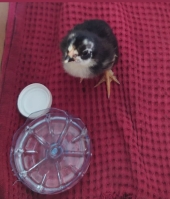
 3
3




“Action on behalf of life transforms. Because the relationship between self and the world is reciprocal, it is not a question of first getting enlightened or saved and then acting. As we work to heal the earth, the earth heals us.” ~ Robin Wall Kimmerer
 5
5




A human being should be able to change a diaper, plan an invasion, butcher a hog, conn a ship, design a building, write a sonnet, balance accounts, build a wall, set a bone, comfort the dying, take orders, give orders, cooperate, act alone, solve equations, analyze a new problem, pitch manure, program a computer, cook a tasty meal, fight efficiently, die gallantly. Specialization is for insects.
-Robert A. Heinlein
 7
7











 4
4




Lorinne Anderson: Specializing in sick, injured, orphaned and problem wildlife for over 20 years.
 4
4




Lorinne Anderson: Specializing in sick, injured, orphaned and problem wildlife for over 20 years.
 2
2




Chris Kott wrote:For me, the livestock vaccine quandary is this: if you vaccinate animals that otherwise would sicken and die, and breed those animals, you pass on their weakness; you end up breeding strains that require the vaccine to live.
That seems dumb to me, or at least short-sighted enough to make me ask if it's a permaculturally-aligned approach. Oh, certainly, treating one animal, one time, to alleviate its suffering and allow it to continue to live and work (but not breed) is understandable. But prophylactic vaccination of unfit livestock so they can live in poor conditions is why the majority of us deplore factory farm conditions and CAFOs. Why does it seem reasonable to extend their ideology even this far?
My advice in short: get strong birds that are unlikely to get sick. If you can get them locally, from a small-scale farmer or homesteader whose poultry you can meet, who also refuses to rely on vaccines, at least prophylactically, then that's your best starting point. If you're keeping everything to healthy bird spec, you might not even need to worry about vaccines.
This makes total sense and helped me feel a bit better about making a choice I really don't like. Thank you. Since ours will be from the hatchery, seems like a wise call.r ranson wrote:My theory is that in a commercial hatchery there are a lot of chickens. Often living inside. I don't know the ventilation conditions or the hygiene requirements they have for their humans. It seems to me, if someone is careless, that's the place the chicken is going to pick something up. So when buying from a commercial outfit, I go with the vaccine option. When home hatched, I don't.
Lorinne Anderson wrote:This may be a geographical issue - is it endemic in some areas, and not in others? Are their factory farms nearby that put you at greater risk?
As to it spreading to the wild, due to viral shedding - I would check with local wildlife rehabbers, Vets or fish and Game/Conservation to see IF this is an actual concern.
Vaccination causes the recipients body to develop an irritation that the body investigates and "takes note". From this it is analyzed, documented and a strategy to defeat this intruder is created, mounted, proven effective and logged for future use. This is how antibodies are created. These antibodies may or may not transfer to offspring - I truly do not know if this potentially transferred immunity ONLY happens in placental animals or if life created from an egg would be the same.
I will run this by my wildlife vet and see if they have any insight.
“Action on behalf of life transforms. Because the relationship between self and the world is reciprocal, it is not a question of first getting enlightened or saved and then acting. As we work to heal the earth, the earth heals us.” ~ Robin Wall Kimmerer

|
So it takes a day for light to pass through this glass? So this was yesterday's tiny ad?
permaculture and gardener gifts (stocking stuffers?)
https://permies.com/wiki/permaculture-gifts-stocking-stuffers
|

